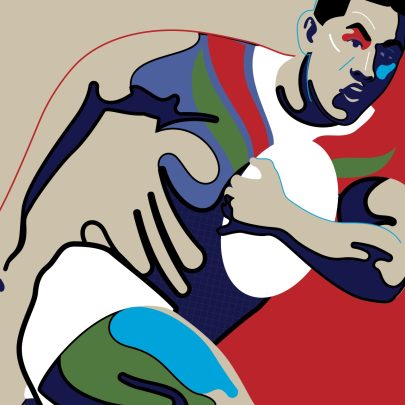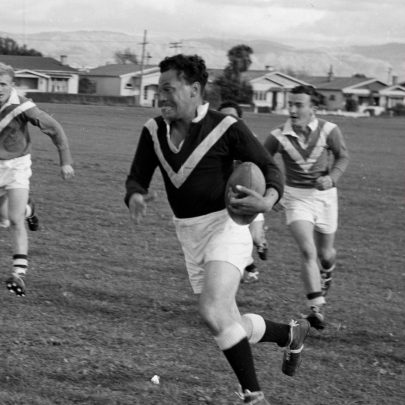Jul 8, 2014 Sport
WHAT’S THE POINT OF THE WORLD CUP
Football and the cruise ship David Foster Wallace sailed in on
Yesterday’s use of footnotes1 was inspired by the footnote king, David Foster Wallace, the genius who hanged himself in 2008.
Once a year I attempt to re-read his great non-fiction masterpiece, A Supposedly Fun Thing I’ll Never Do Again, an 18,000-word meditation on the despair he felt as a passenger on a week-long luxury cruise around the Gulf of Mexico. I had another go at in the weekend. This time around, I saw the cruise ship as a possible metaphor for the World Cup.
Near the beginning of his essay, Wallace writes about a teenage passenger who had jumped to his death from a cruise ship.
“The news version of the suicide was that it had been an unhappy adolescent love thing, a ship-board romance gone bad. But I think part of it was something no news story could cover.”
Wallace wonders about the “unbearable sadness” of a luxury cruise. “On board (especially at night, when all the ship’s structured fun and reassurances and gaiety ceased) I felt despair.”
He tries to define that feeling, and concludes: “It’s wanting to jump overboard.”
The particular and specific sadness of the cruise ship, writes Wallace’s biographer DT Max, was “the senseless attempts by Americans to amuse themselves in the absence of any larger spiritual idea”.
The ship, with its rigorous programme of fun and games, wandered aimlessly on an empty sea.
Isn’t that the World Cup? Isn’t it just a meaningless journey, blustering and hectoring, the best we can come up with in the absence of any meaning and importance in the post-modern world of entertainment and irony?
On its release, Wallace’s book of essays sold 15,000 copies in hardback. Max writes, “It captured well his generation’s ambivalence towards pleasure and marketing and the marketing of pleasure.”
Opposition to the World Cup is usually political. Giovanni Tiso wrote fascinatingly in Overland when he addressed the moot, “Should the World Cup be boycotted?” The comments, for once, are also interesting, especially when Australian extremist Stephen Wright joins the fray.
But the kind of despair that Wallace felt on the cruise ship is an entirely different prospect, and to transfer that feeling towards the World Cup is to wonder whether the tournament is, in essence, a sickness.
Why watch it? What’s the point of it? There is something debasing about the spectacle of the World Cup, with its squads of millionaire athletes toiling away in corporate regimes for our viewing pleasure.
But you can always opt out. You can easily jump off. It’s just a TV show.
But you’d miss the semi-final tomorrow between Brazil and Germany.
News just in from 1954
Once a week, up until the 1970s, the Daily Mirror newspaper in England would stitch its six daily issues together, bind it with a strange yellow cover, and dispatch it by ship to the colonies. It went to South Africa, Australia, Canada, New Zealand.
Now and then you see a stack of them in second-hand stores; I found a bundle of old Mirrors a few years ago in the Hutt Valley, and turned immediately to the sports pages. That particular week covered the 1954 World Cup.
Strange to look back on the progress of the English team. Then, as now, it entered the tournament with low expectations – and still contrived to disappoint.
Match report, June 21: England 2, Switzerland 0. Headline: ENGLAND STUMBLE TO THE LAST EIGHT. Bob Ferrier2, the man from the Mirror, sighed: “England still not good enough.”
Then, as now, England had to play Uruguay. Match preview headline: ENGLAND HAVE A SLIGHT CHANCE.
Unlike now, England had a genius in its team – the great Stanley Matthews. Matthews was 40. The selectors were nervous about playing him. But Hungary’s legendary striker, Ferenc Puskas, told Ferrier: “He is the most wonderful player of all of us.”3
Match report, June 28: Uruguay 4, England 2. Headline: THEY FLY HOME TODAY.
News just in from 2022
Michael Laudrup has been appointed as the new coach of Lekhwiya in Qatar.
Laudrup is one of world football’s greatest-ever players, a stellar presence with Barcelona, Real Madrid, and Denmark. Watching old clips of him remains a thrilling experience. What a player, what imagination and verve – what a ghastly right-wing zealot.
It’s apposite that Laudrup should elect to work in the totalitarian state of Qatar, the corrupt hosts of the 2022 World Cup; in 2004, he became a founder member of CEPOS, a Danish “think-tank”.
What kind of think-tank? It states its aims, thus: “CEPOS is dedicated to preserving and strengthening the foundations of a free and prosperous society by supporting tax-cuts and limited government. The research of CEPOS supports a civil society consisting of free and responsible individuals and fosters policies, institutions and culture that is supportive of a free market economy…”
Maxim Institute of New Zealand! When are you guys going to attract a top sportsman?4
1 And today’s.
2 Ferrier was at Wembley the previous year, and in Budapest a month before the World Cup, when England were famously thrashed by Hungary – respectively, 6-3 and 7-1. He was a witness to history. It was the first time England lost at home; and it marked the end of any persistent illusion that England were the greatest team in the world.
Ferrier gave the matter a lot of thought. Curiously for a journalist, it was intelligent thought. Ferrier knew his football inside out; his father still holds the record for most appearances in the Scottish league, playing 625 times for Motherwell, between 1917 and 1937, banging in 255 goals.
In 1960, Ferrier wrote his book Soccer Partnership, about England captain Billy Wright and the national coach, Walter Winterbottom. Ferrier argued the case for a keener interest in tactical panning.
He was years ahead of his time. He predicted “a new football that encouraged much more exchanging of roles…a constant and fluid switching throughout the team, of positions, functions, responsibilities.”
He was describing Total Football, as created by the great Ajax and Holland teams of the early 1970s.
3 During the interview, Ferrier describes how Puskas is approached by “four very diverting young ladies”. They tell him they have written him a poem, and want to read it out loud to him. According to Ferrier, Puskas replies haughtily: “I am very busy with English journalist. Later, please.”
But this contradicts the usual narrative of Puskas as an irrepressible hedonist. Jim Baxter, the superb Scottish forward, claimed that the only two words of English that Puskas knew were “whiskey” and “jiggy-jig”.
Baxter once took Puskas to a party in Drumchapel, on the outskirts of Glasgow. Half an hour after they arrived, Puskas was discovered by Baxter and other players on the kitchen table with a scullery maid. Weirdly, they stayed and watched the “jiggy-jig”.
4 Wynton Rufer might be ripe for the picking. New Zealand’s best ever footballer featured in a news story last year when he announced that he wanted to set up one of the new charter schools.
Rufer said “there was a lot of nonsense” being spoken about charter schools. “A lot of the controversy to me,” he reckoned, “is about patch protection from unions.”





